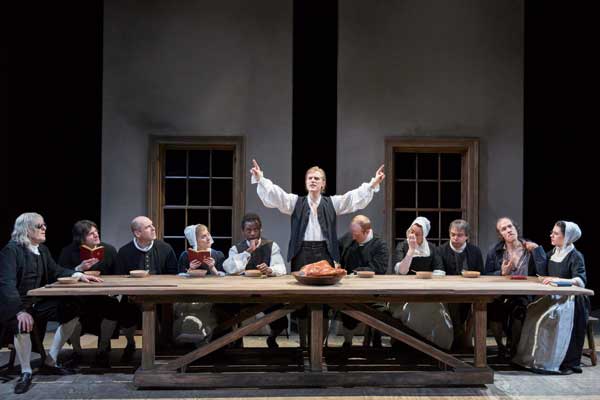A lap of honour at the Royal Court. Bruce Norris has been one of the big discoveries of artistic director Dominic Cooke, who takes his bow by directing The Low Road. Norris’s greatest hit, Clybourne Park, was a savage and illuminating satire about racism. His next trick is to examine the burning issue of the day, unfettered greed. A great start. But he can’t decide whether he’s for or against the profit motive. And he has no idea where to mount his attack.
He time-travels to 18th-century America and imagines an unscrupulous spiv, a bit like Barry Lyndon, who climbs from destitution to wealth and whose life touches American history at various crucial moments. The spiv is called James Trumpett — perhaps a clumsy echo of Donald Trump — and he’s also the bastard son of George Washington. Yeah, right, we get it. He’s capitalism incarnate. Subtler symbolism wouldn’t do any harm. Norris, it must be said, is a marvellous wordsmith and his eloquent pastiche of 18th-century rhetoric is a joy to listen to. But he wants his play to sound up-to-date so he showers it with expletives. Back then, cursing was rarely recorded in published writing so these harsh Viking words sound ugly and out of place. And it’s hard to love the thuggish, rapacious main character, Trumpett.
His ruthless greed is sharply contrasted with the sweet and noble personality of his African manservant, John Blanke, whom he purchases at a slave market. Norris likes writing black characters but he tends to depict them as morally flawless victims of white bigotry, and to endow them with miraculous levels of intelligence, virtue and wit. We’re told that John Blanke was enslaved in West Africa, freed by an English earl, educated to high table standard, named as heir to an estate and a peerage, and then ruthlessly dispossessed by the earl’s scheming daughter.









Comments
Join the debate for just £1 a month
Be part of the conversation with other Spectator readers by getting your first three months for £3.
UNLOCK ACCESS Just £1 a monthAlready a subscriber? Log in